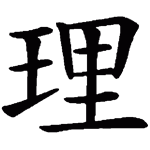
It may only consist of two letters in our alphabet, but the Chinese term li strikes me as being particularly important for anarchism.
Alan Watts says as much, in fact, in his book Tao: The Watercourse Way, when he describes the concept around li as “analagous to Kropotkin’s anarchy”.
Li is all about natural order, an innate and organic pattern to life that emerges without external control or direction.
Watts explains: “Though the Tao is wu-tse (nonlaw), it has an order or pattern which can be recognized clearly… This kind of order is the principle of li, a word which has the original sense of such patterns as the markings in jade or the grain in wood.
“Li may therefore be understood as organic order, as distinct from mechanical or legal order, both of which go by the book. Li is the asymmetrical, nonrepetitive and unregimented order which we find in the patterns of moving water, the forms of trees and clouds, of frost crystals on the window, or the scattering of pebbles on beach sand.”
He adds: “If each thing follows its own li it will harmonize with all other things following theirs, not by reason of rule imposed from above but by their mutual resonance (ying) and interdependence.”
This concept of organic order is an essential part of the anarchist vision. This is why anarchists don’t accept that we need a state or other form of top-down control to regulate human society – we believe our society can regulate itself, from within and from below, in the same way as other parts of the natural world.
It is also the reason why anarchists don’t generally provide a detailed blueprint for the society we would like to see replace the current industrial-capitalist nightmare. It is no more for us to say what this would be like, than it is for anyone else.
If we really believe in anarchy, in organic democracy, then we can do little more than talk about the kind of way we would imagine people living without the yoke of authority. There certainly can be no question of planning, let alone compulsion.
In order to be comfortable with this position, we need to have complete faith in humanity, we need to believe that, while there will always be problems and conflicts within communities, a critical mass of people are sociable, well-meaning, caring, inventive, courageous or diligent individuals who will naturally come together to form a coherent and healthy society. Our ying, our mutual resonance and interdependence, will ensure that this happens.
The task before us, therefore, is to clear the blockage created by modern civilization and its mindset and thus allow us to rediscover our natural freedom in the invisible and indescribable li.
Leave a Reply